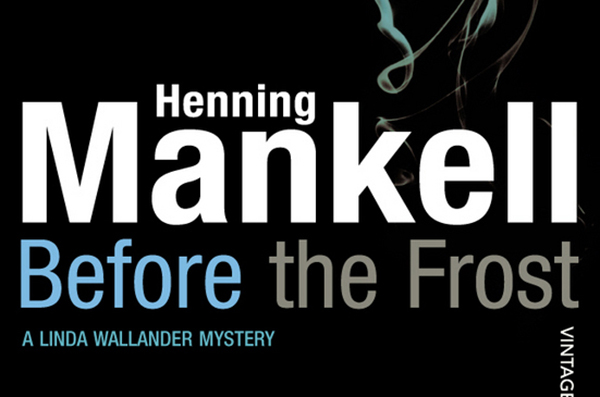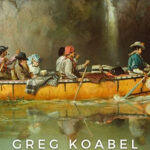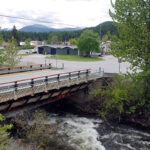Home »

A great introduction into the Swedish mind
Book review
By Derryll White
Mankell, Henning (2004). ‘Before The Frost’
There is a interesting transfer that occurs in ‘Before The Frost. Henning Mankell has been very successful in letting Inspector Wallander grow as a character and age as a man. The Wallender series has taken him through from a rookie policeman to an old and frequently grumpy Chief Inspector. He has been seriously considering retirement for the last couple of novels while his young daughter Linda has twisted in the wind, in the act of becoming a furniture restorer, an actress and playwright, and finally a policewoman. This novel opens with Linda graduated from the police academy and waiting to assume a position on the Ystad, Sweden, police force.
 People here in Ystad are quick to point out to me several things. First they say proudly that Mankell writes about this town and hasten to add that some things are physically changed. Second, the author married Ingrid Bergman’ daughter (don’t ask me why they tell me that). Third, that it was the fashion in Mankell’s time for men to grow old and grumpy, drink too much and question life’s meaning. (Things have changed?) And last, that Mankell’s highlighting of Sweden’s social problems is somehow telling tales out of school. “Things USED to be like that!” “That was a particular time – in the past!” When I push on this I get a sense that Sweden’s move to a more conservative business-oriented path, away from state socialism, is quite okay with them. The dressy clothes, designer haircuts and killer leather boots suggest to me that it might be a particular class of Swedes that are trying to enlighten me.
People here in Ystad are quick to point out to me several things. First they say proudly that Mankell writes about this town and hasten to add that some things are physically changed. Second, the author married Ingrid Bergman’ daughter (don’t ask me why they tell me that). Third, that it was the fashion in Mankell’s time for men to grow old and grumpy, drink too much and question life’s meaning. (Things have changed?) And last, that Mankell’s highlighting of Sweden’s social problems is somehow telling tales out of school. “Things USED to be like that!” “That was a particular time – in the past!” When I push on this I get a sense that Sweden’s move to a more conservative business-oriented path, away from state socialism, is quite okay with them. The dressy clothes, designer haircuts and killer leather boots suggest to me that it might be a particular class of Swedes that are trying to enlighten me.
Is Mankell an embarrassment? Clearly not. Is he an artiste taking license? There is that feeling among this group of his readers. But when I talk to working Swedes, many of whom have not read Mankell, there is a clear sense of agreement that Sweden is in trouble, is taking away important pieces of the social safety net, and is moving toward world conservatism. In short, they support Mankell’s analysis. So do I; that’s why I continue to read him.
There are many themes in this story, intricately interwoven. Two that stand out for me are religion and loneliness, both of which are bound together. Mankell prods and probes at religion, starting with Jim Jones and the Jamestown massacre in Guyana and continuing with sectarian religion in Sweden. But it seems to me that what Mankell is really picking at is the loneliness that consumes so many lives. Man is meant to live in community, to share with others. Readers know that.
In ‘Before The Frost’ Mankell establishes character after character, from Wallender through his ex-wife Mona and a cast of lesser people, all of whom experience distress and breakdown in their lives as a result of loneliness. I know this to be true, that we function best when we can share love and care about one another. I am very appreciative of the way Henning Mankell uses individual memory and social dysfunction to tell his readers to open up their lives and let meaningful human contact in. He may not specifically say to love others so you can love yourself, but he sure points the way.
I liked this book a lot. Kurt Wallender takes the time to mentor his daughter, to begin to share what it is he thinks a good police officer has to have. Linda Wallender grows up from a kid into a full-blown 30-year-old woman with a life path. It is a good novel and, I think, a great introduction into the Swedish mind. Readers may want to read some of the earlier Wallender novels first in order to get full value out of this one.
Excerpts from the novel
SECTS – Jim was no longer the same man they had once been drawn to, the one who had promised them salvation and a meaningful life if they joined the People’s Temple. It was Maria who put her finger on it. “Jim’s eyes have changed,” she said. “He doesn’t see us now. He looks past us and his eyes are cold, as if he wants nothing to do with any of us anymore.”
MEMORY – They had been discussing their differing memories of a holiday they took to the island of Bornholm when she was little. For Linda there was more than this episode at stake; it was as if through reclaiming this memory she was on the verge of gaining access to a much larger part of her early life.
GROWTH – That’s despair, Linda, it’s not the same thing. Everyone has to face up to despair at least once in their life. It’s a rite of passage. If you never find yourself raging at the sea or the moon or your parents you never really have the opportunity to grow up.
SOCIAL RESPONSIBILITY – The laws we live by are supposed to reflect the opinions of society at large.
MEMORY – Our ancestors survive somewhere in our faces, she thought. If you look like your mother as a child, you end up as your father when you age. When you no longer recognize your face, it’s because an unknown ancestor has taken up residence for a while.
UNKNOWN – I am going to turn off from this trail and follow the path I found just a few days ago. I have no idea where it leads, but nothing is as tempting, as magical, as following an unknown path. I still hope that one day I’ll find a path that is a work of art. A path that has been created without a destination in mind, just for its own sake.
A CHILD’S VIEW – Linda felt so sorry for him, he looked so lonely standing there, always available to answer a steady stream of questions, making snap decisions so that the investigation could proceed. He’s walking a tightrope, Linda thought. That’s how I see him. A nervous tightrope walker who should go on a diet and address the issue of his loneliness once nd for all.
CHANGE – “People change. [Wallender] You can never know everything about people. Even friends.”
“Is that true of me too?” [Linda]
“Of me, of you, of your mother, Anna, everyone. Then, of course, there are people who are totally incomprehensible. My father was an outstanding example of the latter.”
SELF – She had once read about a meadow in the forest that could only be found by someone who had lost their way. To her mind this captured some of the mystical dimension of human existence. If one only dared to get lost, one could find the unexpected. There was a whole other world beyond the highways and byways – if you dared to take the road less travelled.
LIFE – Life wasn’t just something that took care of itself. There were big black holes you could fall into with long, sharp spikes at the bottom, monstrous traps.
OLD AGE – Now age had started to claim his body. He took care of himself, chose his food and drink sensibly, kept himself constantly in motion, but the process of growing old had begun. No-one could escape it. God lets us age the better for us to understand we are completely in His hands. He gives us this remarkable life, but as a tragedy so that we will understand that only He has the power to grant us mercy.
EXISTENCE – Right now, I’m nothing more than a traveller in a hotel room, and I can’t remember the name of the hotel.
PRIVACY -Snooping in kid’s stuff is more common than you’d think. Most of my friends had at least one parent who did it. She thought about her father. He had never been through her things. Sometimes she had seen him peer through her half-open door to make sure she was there, but he never made surreptitious expeditions into her life. That had always been her mother.
PUBERTY – She had been only 14 at the time, in the midst of those fearful teenage years when nothing seems possible or comprehensible, but when everything is at the same time straightforward, easy to see through. All parts of the body vibrate with a new hunger.
MEMORY – Linda could still recall Mona’s repeated war cry: “I don’t give a shit what you do as long as you don’t get pregnant.” Linda could also hear echoes of her own shouts, their sound, not the words. She remembered the embarrassment, the fury, the humiliation.
FATHERS – The talented but gloomy policeman – who had a sense of humour but never let himself laugh. My father who never found a new woman to share his life since he still loves Mona. Baiba tried to explain it to him, but he wouldn’t listen. According to Baiba, he said, “Mona belongs to the past.” But he never got over her and he never will. She is his one great love.
RELIGION – “Me and God never got along.”
PARENTS – The eleventh commandment is the most important, she thought, the one that reads: “Thou shalt never become like thy parents.”
RELIGION – “There is only one God,” Erik Westin said at the beginning of all his prayers. “One God and His only son, whom we crucified. This cross is the symbol of our only hope. The cross is plainly made – of wood, not gold or precious marble. The truth lies in poverty and simplicity. The emptiness we carry inside can be filled only by the Holy Ghost, not by material goods or riches, however tempting they may appear to us.”
RELIGIOUS INSANITY – All sacrifice is made for the creation of life, he thought. No-one knows if they have been chosen to live or to die. He had re-instituted the ritual sacrifices with their origin in the earliest days of Christianity. Life and death went hand in hand: God was both logical and wise. Killing in order to sustain life was an important practice in combatting the emptiness that existed inside man. Now the moment was here.
CLASS – “I talked to fru Tademan. She is not what you would call a particularly pleasant woman. In fact she’s about as good an example of an arrogant, conceited Scanian aristocrat as I’ve ever had the misfortune to meet.” [Wallander]
MEN – When she flipped it open she was confronted with a bad sketch of a seductively posed naked woman. To her surprise she saw it was Martinsson’s notepad. But why should that surprise me? she thought. All the men I know spend an enormous amount of mental energy undressing women in their minds.
 Derryll White once wrote books but now chooses to read and write about them. When not reading he writes history for the web at www.basininstitute.org.
Derryll White once wrote books but now chooses to read and write about them. When not reading he writes history for the web at www.basininstitute.org.







